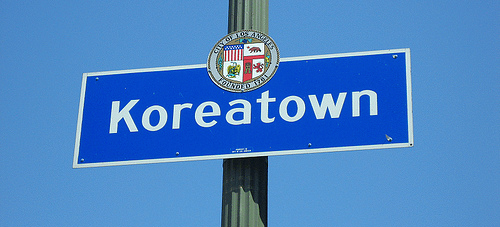Among Los Angeles Koreatown old-timers, Hi-Duk Lee is widely known as a pioneer who led forming of K-town. Coming from West Germany to Los Angeles in the late 60s, Lee has gone through failures and successes until he finally settled down on his nursery in Eagle Rock six years ago. Here at Echo Garden, we met Hi-Duk Lee, who greeted us with a big smile and soiled hands.
 In 1968, Hi-Duk Lee with his wife immigrated to Los Angeles after spending three years as a minor in West Germany. With some bank loan and 7,000 dollars he and his wife saved in the first three years of immigration, they bought a market on Olympic Blvd., renamed it as Olympic Market, and started what later became the first step to form K-town.
In 1968, Hi-Duk Lee with his wife immigrated to Los Angeles after spending three years as a minor in West Germany. With some bank loan and 7,000 dollars he and his wife saved in the first three years of immigration, they bought a market on Olympic Blvd., renamed it as Olympic Market, and started what later became the first step to form K-town.
Many sociologists studying Korean American community and immigration in Los Angeles claim Olympic Market as the root for Los Angeles Koreatown. A corner of the building was used as the post board to find family members and friends, acting as a medium to connect and form the community. Even though business was not so successful at the initial stage, increasing migration gave him a success, selling near 300,000 dollars per month in three years after opening. Successful business at Olympic Market enabled him to purchase more properties and expand business, which includes Young Bin Kwan in 1975.
“I wished to form a Korean town in Los Angeles as I was expanding my business,” said Lee. “There are Chinatowns in major cities in the U.S., but not Koreatown. I thought raising a building was the first step to form Koreatown.”
 Such thought led him to open Young Bin Kwan, which had been a monumental building that marked Koreatown. To build Young Bin Kwan, Hi-Duk Lee traveled to Korea to air transport Chunggiwa, blue roofing tiles used in traditional Korean buildings. Main stream society recognized his effort, acknowledging Young Bin Kwan as the first building stone for Koreatown.
Such thought led him to open Young Bin Kwan, which had been a monumental building that marked Koreatown. To build Young Bin Kwan, Hi-Duk Lee traveled to Korea to air transport Chunggiwa, blue roofing tiles used in traditional Korean buildings. Main stream society recognized his effort, acknowledging Young Bin Kwan as the first building stone for Koreatown.
After opening Young Bin Kwan, Lee purchased five blocks near Olympic and Normandie, named the area “Korean Village,” then started consecutive projects to develop Koreatown. First project of Korean Village was found to be successful, but when he met financial crisis due to sudden raise of interest rate on bank loans, Lee could not continue to pursue his dream.
Spending a decade in China, Lee has come back to Los Angeles 6 years ago to open Echo Garden. Managing a nursery business is not an easy task for a 76-year-old man. He nonetheless finds 12 hours of daily labor happy and joyous. Lee, however, does not try to visit Koreatown or meet his old friends in Los Angeles. Financial failure in Koreatown left scars, but he affirms that there is no regret.
“I’ve lost much money, but I don’t regret what I’ve done since it all happened in Koreatown. My failures became fertilizer to bloom flowers. You know, an old-timer never dies. He just disappears,” Hi-Duk Lee said in a laugh.
Original document available from www.koreadaily.com/news/read.asp?art_id=4147326
Translated by Heewon Kim


![U.S.-South Korea alliance at risk if Seoul stays neutral, warns former U.S. official Stephen Biegun, former U.S. Deputy Secretary of State, has an interview with the Korea Daily at Aspen Security Forum. [Sangjin Kim, The Korea Daily]](https://www.koreadailyus.com/wp-content/uploads/2025/07/0718-Beagan-100x70.jpg)

